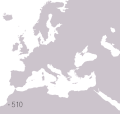Priscianus Caesariensis (fl. AD 500), commonly known as Priscian (/ˈprɪʃən/ or /ˈprɪʃiən/), was a Latin grammarian and the author of the Institutes of...
11 KB (1,317 words) - 21:10, 2 November 2024
Priscian of Lydia (or Priscianus; Ancient Greek: Πρισκιανὸς ὁ Λυδός Prīskiānós ho Lȳdós; Latin: Priscianus Lydus; fl. 6th century), was one of the last...
5 KB (484 words) - 17:07, 28 November 2024
Gall Priscian Glosses (Codex Sangallensis 904), abbreviated Sg., is an Irish manuscript of the Latin grammar Institutiones grammaticae by Priscian, held...
6 KB (802 words) - 06:41, 26 December 2023
this Late Latin didactic poem are both uncertain; it was attributed to Priscian but is now attributed to Rem(m)ius Favinus/Flav(in)us. The poem's title...
15 KB (1,512 words) - 08:40, 9 February 2025
special attention to the early Latin writers, and is highly spoken of by Priscian. Caper was the author of two works: De Lingua Latina and De Dubiis Generibus...
1 KB (173 words) - 17:47, 24 March 2023
Maximus was one of the most copied Latin prose authors, second only to Priscian. More than 600 medieval manuscripts of his books have survived as a result...
14 KB (1,923 words) - 20:41, 13 December 2024
one sentence survived in the Latin grammar work by Priscian. To describe a grammatical rule, Priscian cites Trajan: inde Berzobim, deinde Aizi processimus...
3 KB (207 words) - 17:28, 18 September 2024
buckshot size Star of Gallantry, an Australian gallantry decoration St. Gall Priscian Glosses, a set of Old Irish and Latin glosses This disambiguation page...
3 KB (393 words) - 05:31, 8 January 2025
Petronius Phaedrus Plautus Pliny the Elder Pliny the Younger Pomponius Mela Priscian Propertius Quadrigarius Quintilian Quintus Curtius Rufus Sallust Seneca...
141 KB (16,460 words) - 13:02, 24 February 2025
others, such as Sacerdos (3rd century AD), Dositheus (4th century AD) and Priscian (c. 500 AD), recognised four different groups. In modern times grammarians...
90 KB (6,948 words) - 16:53, 27 January 2025
translated into Latin by Rufius Festus Avienius, and by the grammarian Priscian. Archbishop Eustathius of Thessalonica wrote a commentary on his work for...
5 KB (445 words) - 16:33, 28 November 2024
Petronius Phaedrus Plautus Pliny the Elder Pliny the Younger Pomponius Mela Priscian Propertius Quadrigarius Quintilian Quintus Curtius Rufus Sallust Seneca...
161 KB (17,616 words) - 08:59, 25 February 2025
treatment by the Florentines. He also identifies other sodomites, including Priscian, Francesco d'Accorso, and Bishop Andrea de' Mozzi. The Poets begin to hear...
95 KB (12,663 words) - 18:56, 19 February 2025
such long a journey; however, they sent three—Syriacus, Eusebius, and Priscian—with a joint synodal letter to Pope Damasus, Ambrose, archbishop of Milan...
5 KB (645 words) - 18:55, 14 February 2025
Festus, Aulus Gellius, Isidorus Hispalensis, Macrobius, Nonius Marcellus, Priscian, Marcus Terentius Varro). Much of the information concerning the life of...
16 KB (1,971 words) - 00:22, 5 February 2025
Petronius Phaedrus Plautus Pliny the Elder Pliny the Younger Pomponius Mela Priscian Propertius Quadrigarius Quintilian Quintus Curtius Rufus Sallust Seneca...
104 KB (11,068 words) - 00:18, 24 February 2025
Ages, following the influence of authors from Late Antiquity, such as Priscian. Treatment of vernaculars began gradually during the High Middle Ages,...
24 KB (2,770 words) - 16:22, 20 February 2025
do with the commentator, but belong to a much later date; the time of Priscian (6th century). Both are printed in Keil, Grammatici Latini. Aelius Donatus...
2 KB (215 words) - 21:16, 21 January 2024
According to Priscian, delenda is a participle because it agrees in number, case, and gender with a noun, namely Carthago, the subject. In Priscian's theory...
9 KB (1,187 words) - 18:14, 30 October 2023
including the Ars minor and Ars major of Aelius Donatus, the grammar of Priscian, the Etymologiae of Isidore of Sevilla and the grammar of Alcuin. Furthermore...
2 KB (204 words) - 13:43, 17 February 2024
Caesar have been suggested as possible patrons of Varro's writings. Ennius Priscian Charles Thomas Cruttwell, History of Roman Literature (1877) Archived 2008-12-02...
4 KB (352 words) - 16:25, 9 August 2024
Petronius Phaedrus Plautus Pliny the Elder Pliny the Younger Pomponius Mela Priscian Propertius Quadrigarius Quintilian Quintus Curtius Rufus Sallust Seneca...
145 KB (19,301 words) - 14:00, 18 February 2025
Roman numeral Ↄ, but 20th-century philologists, working from copies of Priscian's books, believe it to instead resemble two linked Cs (Ↄ+Ϲ), which was a...
7 KB (653 words) - 08:45, 2 January 2025
Velleius' life are known with certainty; even his praenomen is uncertain. Priscian, the only ancient author to mention it, calls him "Marcus", but the title...
17 KB (2,290 words) - 13:56, 9 September 2024
2nd-century compilers, and is himself quoted and praised three times by Priscian in the 5th century, and so must have lived between these dates. According...
10 KB (1,314 words) - 16:21, 19 November 2024
Petronius Phaedrus Plautus Pliny the Elder Pliny the Younger Pomponius Mela Priscian Propertius Quadrigarius Quintilian Quintus Curtius Rufus Sallust Seneca...
32 KB (3,684 words) - 11:58, 10 February 2025
Ovid's other works. A line from a work entitled Epigrammata is cited by Priscian. Even though it is unlikely, if the last six books of the Fasti ever existed...
87 KB (11,687 words) - 21:56, 1 February 2025
dubbed syncategorematic, (i.e., prepositions, logical connectives, etc.). Priscian in his Institutiones grammaticae translates the word as consignificantia...
6 KB (694 words) - 08:51, 4 June 2024
Petronius Phaedrus Plautus Pliny the Elder Pliny the Younger Pomponius Mela Priscian Propertius Quadrigarius Quintilian Quintus Curtius Rufus Sallust Seneca...
96 KB (10,812 words) - 01:03, 15 February 2025
Petronius Phaedrus Plautus Pliny the Elder Pliny the Younger Pomponius Mela Priscian Propertius Quadrigarius Quintilian Quintus Curtius Rufus Sallust Seneca...
50 KB (6,146 words) - 13:57, 13 January 2025

















